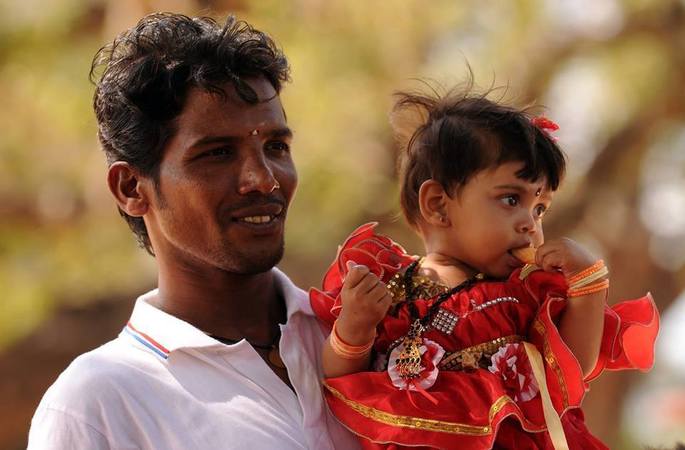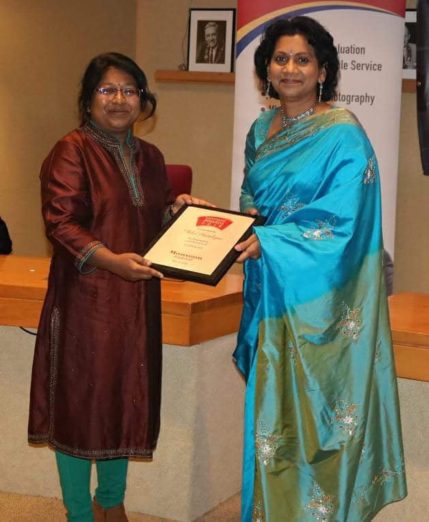Thulasi Muttulingam is the creator of Humans of Northern Sri Lanka, a group which narrate stories of people and communities in the North of Sri Lanka. She is also a journalist, feature writer and an activist.
The creation of empathy is essential in a society recovering from war and riven by divisions of race, religion, culture and socio-economic differences.
Any of the Facebook chats and discussions Thulasi initiates have the effect of causing her readers to gain insight into the everyday lives, habits and concerns of people from the Northern regions of Sri Lanka, whom they would not usually interact with, being themselves based in Colombo. Her use of her skills, her experience, her insight and her platform to highlight what is often seen as occurring in the margins of mainstream society is notable.
We at FemAsia are always interested in the narratives of the marginalised and the unrepresented societies. We hope that this interview provides insight into one of the forgotten realms of Sri Lanka.
What prompted you to start the group ‘Humans of Northern Sri Lanka’ and what are the motives behind it?
I gave up full-time journalism work in Colombo to become a freelancer travelling the North and East of the country in 2013. I did that because most of us living in Colombo, including myself then, were living in a bubble far removed from the realities of the war-affected people in rural areas. And we had no business writing about them – if we wrote about them at all – in that context.
No mainstream media in Colombo at the time was willing to support me as a full-time correspondent based in the North-East. They offered piecemeal rates as a freelancer instead, which wouldn’t even cover the costs I incurred of travelling to get the story – such as the case of media and underpaid journalists who strike out on their own.
So I got a job with an INGO called ZOA that worked with war-affected people in the North and East. Through them, my food and accommodation, travel through these areas and access to people and stories were ensured.
The only problem was, I was coming in contact with literally hundreds of stories and no time to write them out in the journalistic long form of investigative feature writing I was used to, on top of my full-time job as a reporting officer at Zoa, where I had to compile internal reports.
I was feeling sick with guilt over my pile of notebooks of untold stories that people had entrusted me with.
So, do you say that Humans of Northern Sri Lanka sprouted from these untold stories?
They were so thrilled that someone was finally asking them what had happened to them instead of just hijacking their voices. They couldn’t recognize themselves as being represented in the mainstream media – and went all out to tell me their stories when I said I was a journalist.
I was feeling overwhelmed with the pressure of it all, and suffering from fever. To keep down the stress, I was scrolling through one of my favourite pages Humans of New York when an epiphany struck. Why not start a page like that? There was already a trend of various pages modelled on Humans of New York, from various geographical locations – including two from Sri Lanka.
Since I was then based mainly in the North, travelling through its various regions, I decided to start a page called Humans of Northern Sri Lanka – that was in late 2014.
The page allowed me to put out the many stories I came across on a snippet basis, instead of the time-consuming investigative long-form journalism I had been used to. And coincided neatly with a population that didn’t have time to read articles but were on facebook all the time. I have far more traction for my stories there than for the serious work I put in as a journalist, which I find somewhat ironic.
Do you expect to raise awareness of the issues affecting Tamils and other minorities, and of women, who are statistically not a minority, but still treated as if they are secondary citizens?
Yes, it is my specific intention. Far too often many of us – including journalists, policymakers, activists, diaspora stakeholders – are guilty of assuming the voices for these people, instead of letting them speak for themselves. The people here are very much aware of the problem and very angry about it.
As some Muslim and Tamil women put it to me at a women’s forum meeting in Mannar some years ago: “We know all about Colombo, its people, their views and problems. That’s because the mainstream media writes about Colombo and its people’s views regularly. We also travel regularly to Colombo, so we know what the situation is like there.
The reverse is not true. The people of Colombo have no idea of our life circumstances, views and issues. If they come this way at all, they stay in town hotels or Pansala accommodation away from the common people. They do not mix with us nor life circumstance sees us represented adequately in the mainstream media. Yet people who make decisions on our behalf are mainly drawn from Colombo.
Even when we agitate for minority representation, we are not happy if it is Colombo Muslims or Colombo Tamils representing all the Muslims and the Tamils across the region. They are far removed from our issues here, and thus cannot represent us.”
It is very logical and absolutely right when you think about it. So in my own small way, I try to make their voices and views heard as much as possible.
What do you think of Women representation in the media?
This is also true of women, en masse. How much of newspaper content is actually geared towards representing women adequately, and to having pages they would enjoy reading? And I don’t mean fashion, beauty and cookery pages which is an outdated notion set by male editors that that is all that women want to read about.
And if we ourselves as women are represented in the front pages of papers and magazines at all, it is more often than not, half nude and pouting. We are far more than that.
Do you think that the challenges women have to undergo are talked about?
When I got to the North, I was horrified by the weight of the burdens women were struggling under, that just wasn’t making it to the mainstream press – and if it did it was always sensationalized.” XX village now a village of Prostitutes,” blazed one Tamil headline. It was 2013, and widowed women had to resort to prostitution to feed the children and elderly left in their care, in the absence of viable economic alternatives. Their pain, their courage, the lack of options left to them, obviously did not get carried in that article.
Widow shaming, poverty shaming, exploitation, degradation, economic embargoes on traditional occupations such as fishing and farming… blatantly less pay for equal work, these are all issues women continue to face in these regions. Yet how much of their daily realities make it out there into the press?
We now have a euphemistic name in Sri Lanka in development circles for widowed families – ‘women-headed households.’ Term them what you like, but they are still called ‘widows’ and still shamed in obscene ways in these regions, as harbingers of doom and inauspiciousness. Yet when I try to write/talk about them, many people in the city / urban areas challenge these stories as untrue. Such habits might have died out in urban areas, but are still alive and kicking in rural areas – and this needs to be written about, talked about and actively addressed.
What insight have you gained through your engagement with the diaspora community over the past few years?
I first realised the diaspora were on another planet altogether when it came to understanding the issues and realities back home, on a visit to the USA. They were getting their information from certain sites that made it seem as if the Tamils were being murdered, raped, pillaged and plundered in Sri Lanka all the time.
Not to say it didn’t happen at certain points in our history – but no, that is not all that ever happens to us.
Also, the fact our so-called ‘saviours’ who hijacked for themselves the ‘sole voice and representatives of the Tamils’ role, were also themselves the cause of several cases of abuse to the Tamils back home, don’t make it out in such outlets – mainly because the LTTE rump is still running such media.
Of course, there are other informational sites and dedicated journalists trying to counteract bias with a more wholesome picture like D.B.S Jeyaraj – but the vocal sections of the diaspora (who as it happens are a minority) were insistent on reading only the biased sites.
What I realised on that trip was that the voice of the affected people in the North and East were not making it out there. Others were just mouthing narratives in their names, which they never said, or stood for.
This USA trip, as part of a Visitor Leadership Program sponsored by the US Government, was in 2012.
In 2013, I moved to settle in the North, and have been reporting directly from there.
Since then, I have been to the UK, Malaysia, Singapore, and most recently Canada on varied journalism grants – in all of which countries I have met and interacted with Tamil / Sinhala diaspora members.
I found that as here, there too, many of the diaspora members are actually quite moderate and reasonable in their views. As I noted before, it is just the vocal minority who have hijacked the stage, and the microphone, a space from where they keep claiming to speak on our collective behalf – a mandate no one gave them.
What are the benefits you feel that social media has offered your projects, in the fields of activism; and in the raising of awareness regarding ethnic diversity and tolerance?
– Social media reaches out to the masses fast. That’s one advantage.
– It doesn’t take much of my time to engage in.
– The stories don’t go through several filters of various editors before I hit the publish button – I have full control of my content instead of waking up to see a heavily re-edited version of what I had meant to convey under my byline the next day, as has happened all too often in the mainstream media.
Additionally, people respond better to pictures and stories on social media – they have little time for newspapers now, but many, especially the younger generation are on Facebook, Instagram, Twitter etc. I don’t have the time to work on all these platforms, but Facebook alone is good enough for me to get the word out.
And many people have messaged to tell me that I have opened their eyes to the issues, lives and realities of the people in Northern Sri Lanka.
And in that way, instead of succumbing to demonising and ‘othering’ narratives, they have access to the human stories directly from those humans themselves.
It is very interesting to observe how Thulasi, who is often viewed as an ‘outspoken feminist’ in a conservative culture and community, thinks about how a woman protects herself and her family, as a public figure. She says that most of the blows, fortunately, are verbal and emotional, not physical. Thus she has just developed a crocodile skin to put up with it.
There is a limit to how much we can subsume ourselves to please others. Conservative cultures that are offended by women being free spirits is not a new thing.FemAsia wishes Thulasi all the very best in her endeavours.
Featured Image Credits to Amila Gamage




